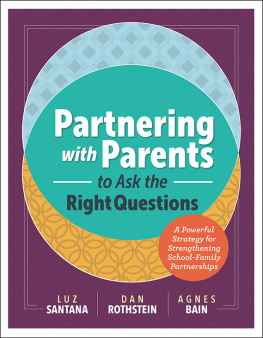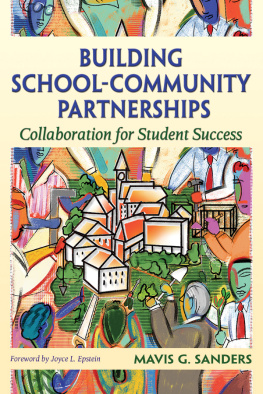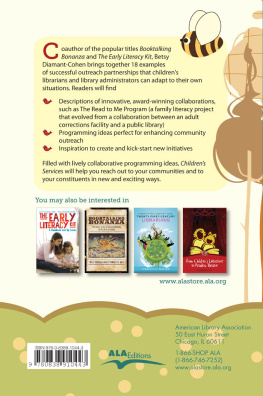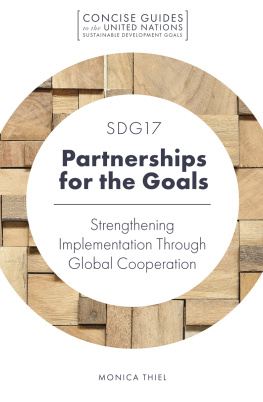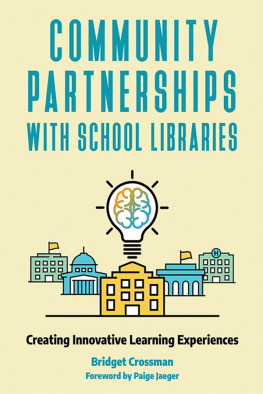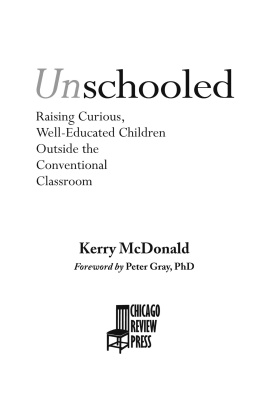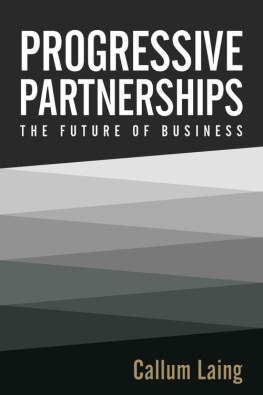* * * * *
To the parents in Lawrence, MA, who got us started
and to the educators and parents who will build
strong partnerships in many more communities.
***
Acknowledgments
....................
We are grateful to the parents in Lawrence, MA, who more than two decades ago provided the first insight that shaped the work that led to this book. Many people helped get this work started in Lawrence, including parent leaders Nancy Rodriguez, Barbara Hendricks, Jose Rodriguez, and Wendy Gardner; municipal colleagues Ana Rodriguez, Carmen Schumann, Grecia Alemany, Patricia A. Driscoll, Richard Kobayashi, David Bain, and Patricia Karl; and consultants to the Annie E. Casey Foundation Erik Butler, Manuel Gutierrez, Pauline Lipman, Joe Onosko, and Gary Wehlage.
We continued our learning as we began to partner with community organizations, human service agencies, and parent involvement programs, including the Latino Parents Association in Boston, MA; the Paterson (NJ) Education Fund; the Prichard Committee for Academic Excellence (KY); the Center for Collaborative Planning (Sacramento, CA); the Family Resource Coalition (Chicago, IL); Teaching for Change (Washington, DC); as well as many federally funded Parent Information and Resource Centers around the country. We greatly benefited from doing direct work with Margaret Gallagher and the parent liaisons from the Cambridge, MA, public schools.
Ana Rodriguez, Krystal Robinson, Ana Karchmer, Patricia A. Nelson, and Naomi Campbell made valuable contributions to the development of our strategy across multiple fields. We benefited greatly from the wisdom of Amy Shine Jones, Donna Muncey, Cheryl Almeida, and Christine Pizer, whose assessment and evaluation work helped identify key lessons from both parents and educators. We were also fortunate at the beginning of our journey to learn from Jane Vella, a truly great adult educator who taught us so very much about "teaching to learn" and "learning to teach," as well as about the power of saying "thank you."
We were fortunate to receive strong support at various times from foundations that funded our work with parents in communities around the country, including the Boston Foundation, the Wallace Funds (then known as the DeWitt Wallace Reader's Digest Fund), the Joyce Foundation, the Rhode Island Foundation, the Rockefeller Brothers Fund, the Barr Foundation, Jane's Trust, and, at a particularly challenging moment, the Germanacos Foundation.
We are grateful to our current funders who have provided critical support to continue our work with parents as part of the Right Question Institute's overall commitment to Microdemocracy. Mary and Ted Wendell of the Hummingbird Fund have provided generous, consistent support that made possible our work in multiple fields and over this past year allowed us to focus on writing this book. John Esterle has been a strong advocate for us helping secure stable, multiyear support from The Whitman Institute. As we move ahead, we also look forward to combining school-family partnerships with our parallel work strengthening the capacity of teachers to teach students to ask their own questions as part of the Million Classrooms Campaign, supported by the Sir John Templeton Foundation.
We have also benefited greatly from major donor support from Diane Englander and Mark Underberg, Franklin M. and Ellen P. Fisher, Stephen Quatrano and Dr. Doreen Karoll, and Nathan Rothstein of Project Repat.
The board of directors of the Right Question Institute is made up of a remarkable group of idealistic, visionary, and determined people who have been full partners in this work for many years, have helped steer the ship, provided moral support, and kept the lights on! We are grateful to each of them: President of the Board Mary Wendell, Vice President Diane Englander, Clerk Macky Buck, and members Gail Fuller, David Guberman, Shonak Patel, Stephen Quatrano, Dr. Carol Robey, and Enid Shapiro. We also appreciate the encouragement to pursue our school-family partnership work from past board members Richard Weissbourd of the Harvard Graduate School of Education; Ron Walker, CEO of the Coalition of Schools Educating Boys of Color; and Franklin M. Fisher, professor emeritus, MIT.
Specific chapters were greatly enhanced by insights from Elizabeth Bain, a school psychologist in Lawrence, MA; and Ariela Rothstein, a high school history teacher in Brooklyn, NY. We have benefited from conversations over the years with Julia Coffman and M. Elena Lopez of the Harvard Family Research Project; our collaboration with Commissioner Virginia Barry; and colleagues Mary Earick and Art Ellison at the New Hampshire Department of Education, Irv Richardson of NEA-NH, and leaders in the field of parent involvement, including Karen Mapp, Ann Henderson, Don Davies, Vivian Johnson, Tony Wagner, Mary Harrison, Steve LeClair, Lynne Simons, Kate Miller, Theresa Jensen, Kate Gill Kressley, Bryan Samuels, Bev Raimondo, Carol Edelin, Ethel Seiderman, the late Bob Sexton, and the late Barbara Shaw. Natasha Freidus of Creative Narrations provided superb documentation of what parents in many communities were learning, thinking, and feeling as they acquired the skills to participate more effectively in their children's education. We also appreciate the encouragement and support from faculty at the Harvard Graduate School of Education, including Richard Murnane who first wrote about our work with parents in his 1995 book Teaching the New Basic Skills, Karen Mapp and graduate students in her courses on family and community engagement, and Meira Levinson who convened a colloquium at Harvard on the theory and practice of the Right Question Institute.
While working on this book, we had strong support from staff and interns at the Right Question Institute. We are indebted to Andrew Minigan, Education and Research Project Coordinator, who goes above and beyond the call of duty and brings great energy and wisdom to work every day. Lavada Berger and John Sessler provided additional key support over the past year. We are also grateful for the smart digital strategy and web management work done by Morgan Schwartz, which allows more people to access the Right Question Strategy. We greatly appreciate all of the hard work from our interns, led by Mikah Farbo's diligent research and bibliographic skills with additional insights and support from Codie Kane, Kelly Wallace, Diana Morrill, Aisha Suara, Sara Peck, Neil Alacha, Danielle McPeak, Solange Azor, Kendall Gedeon, Gavin Hui, and Betsy Waisel.
We are pleased to partner with ASCD to bring the Right Question Strategy to its extensive network of educators around the country. Genny Ostertag took the initiative to get things started. Susan Hills, acquisitions editor, always communicated thoughtfully and respectfully and then helped deliver the manuscript into the experienced and skillful editorial hands of Jamie Greene. To all of the above and our dear families and friends, we say thank you.
Luz Dan Agnes
Introduction
Making Meaningful School-Family Partnerships Easier
....................
The educators and parents you will meet in this book quietly do something quite remarkable. They demonstrate how to work together for the benefit of all students by using a simple and cost-effective partnership strategy.
The examples we present are drawn largely from low- and moderate-income communities around the country where both educators and parents are asked to do too much with too few resources. Each day, they must confront the painful reality, as the economists Greg Duncan and Richard Murnane (2014) have documented, where economic inequality is increasing, with harmful effects on the housing stability, physical and emotional health, safety, and general well-being of childrenall of which makes the work of educators that much more difficult.

